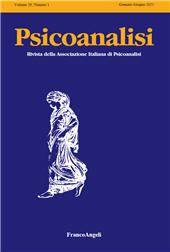Stare a galla senza salvagente : paura, bisogno e desiderio di dipendere in analisi
49-66 p.
Verrà presentato l'estratto di un caso clinico. Si rifletterà sulla condizione umana che non si presta a facili e rigide categorizzazioni, tantomeno se queste sono basate sui comportamenti. Per comprendere il reale funzionamento e le potenzialità di una persona sono necessari tempi lunghi e una relazione di sufficiente vicinanza emotiva. Momenti difficili della vita o circostanze particolari possono indurre una persona ad assumere condotte che forse non avrebbe messo in atto in situazioni maggiormente favorevoli. La condotta sintomatica necessita di venire accolta per favorire la riconciliazione con sé stesso del paziente: può essere la conseguenza di una regressione difensiva, talvolta anche non priva di rischi, con sacrificio di libertà e vitalità, per la necessità di certezze rassicuranti rispetto ad angosce profonde di integrazione, spesso poco o per nulla consapevoli. Per valutare l'andamento di un'analisi occorre tenere in mente non solo le azioni di un paziente ma la relazione
tra queste e le fantasie inconsce nonché con l'evoluzione nel tempo e nella relazione. Un tema centrale dell'analisi di Marta, e forse di ogni percorso analitico, è quello della dipendenza. Questo problema merita un'attenta riflessione, in particolare per quanto riguarda scelte terapeutiche complesse come la frequenza delle sedute. [Testo dell'editore]
An excerpt from a clinical case will be presented. The reflection will focus on the human condition, which resists easy or rigid categorization-particularly when based solely on behaviour. To truly understand people's functioning and potential, one must spend considerable time with them building a relationship with sufficient emotional intimacy. Difficult periods in life or specific circumstances may lead someone to adopt behaviours they would not typically engage in under more favourable conditions. Symptomatic behaviour must be acknowledged in order to facilitate the patient's reconciliation with themselves. Such behaviour may be the result of defensive regression, which is not without risks, and may involve sacrificing freedom and vitality in exchange for reassuring security and certainty in the face of deep, often unconscious, anxieties about integration. When evaluating the progress of an analysis, it is important to consider not only the patient's actions but also the
relationships between those actions, unconscious fantasies, and how these evolve over time and within the therapeutic relationship. A central theme in Marta's analysis and perhaps in any psychoanalytic process is dependency. This issue warrants careful reflection, particularly with regard to complex therapeutic decisions, such as determining the frequency of sessions. [Publisher's text]
-
Artikel aus derselben Ausgabe (einzeln erhältlich)
-
Informationen
ISSN: 1972-490X
THEMENBEREICHE
KEYWORDS
- dipendenza, regressione, sintomo, spazio transizionale
- dependence, regression, symptom, transitional space


